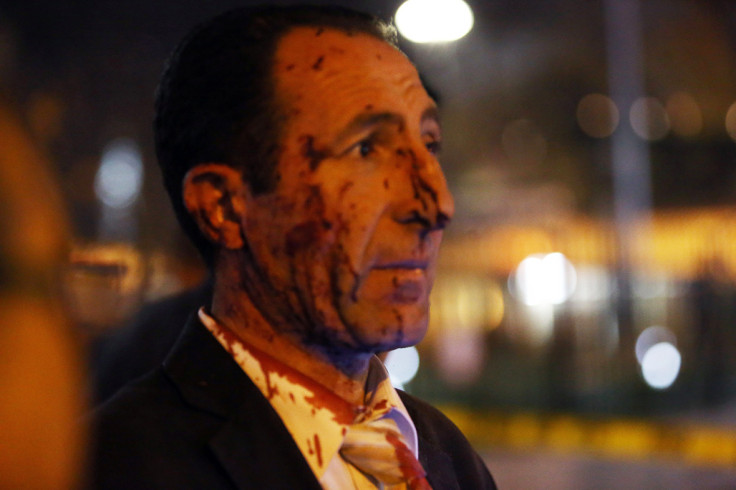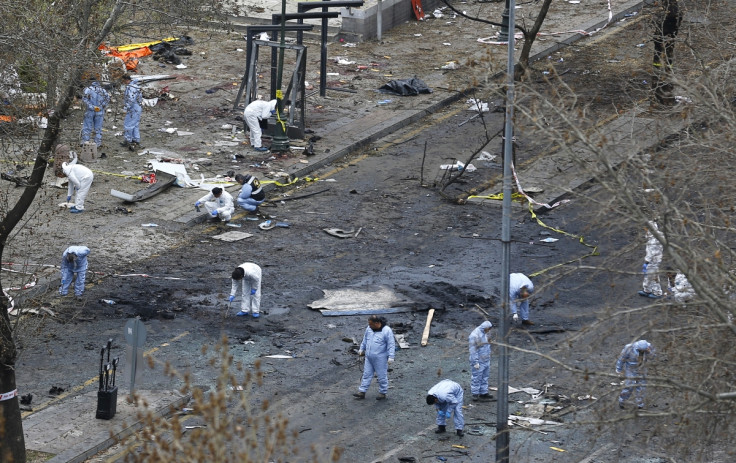Turkey reels from Ankara atrocity as fears heighten of more bloodshed

Dark clouds gather over Ankara's skies with three major terror attacks in a row that have hit the Turkish capital since October 2015. And the security situation risks further deteriorating in the coming period in Turkey, squeezed by terrorism at home and war in its immediate neighbourhood.
Sunday's explosion with a bomb-laden car struck the capital's heart, Kizilay Square, and resulted in at least 37 killed and 125 wounded. The area was very close to government offices including the Prime Ministry and the Ministry of Education. Preliminary evidence shows that one of the bombers was a female university student who joined the outlawed Kurdistan Workers' Party (PKK) in 2013.
Turkey has been targeted by several terrorist attacks by both Islamic State (IS) and a new wave of terrorist insurgency by the PKK during the last year. In July 2015, 32 pro-Kurdish and socialist youth activists were killed in a bomb attack allegedly by Isis (Daesh) in Suruc, a Turkish south-eastern town close to the Syrian border.
In October 2015, 102 people were killed in a suicide bomb attack against a peace rally again allegedly by Isis in Ankara, mainly attended by pro-Kurdish and socialists youth. In January 2016, Isis conducted another suicide bombing in Istanbul's popular Sultanahmet Square, claiming the lives of 11 German tourists and 1 Peruvian.
The threats Turkey is facing currently are all spillover effects of the Syrian civil war and the role Turkey has chosen to play in it.
The terrorist attack against military service buses carrying ranked and civilian staff on February 17 in Ankara, claimed by Kurdistan Freedom Falcons (TAK), another extremist splinter group linked to the PKK, resulted in the death of 32 and wounded 75 citizens.
The high frequency and magnitude of these attacks has created a sense of insecurity among the Turkish society. Some started questioning the capacity of the government in preventing these events and have demanded accountability. Others think these terrorist attacks are targeting the AKP government and President Erdogan.
Rather than acting in an accountable manner, authorities preferred to bring an immediate media blackout just after each attack, and provided the public with limited information, which failed to decrease the tension.
Turkey's obvious vulnerability to terrorism is a factor of weaknesses in our security apparatus as well as multiple threats it is facing. Some of the weaknesses in Turkey's security apparatus are a result of court cases and investigations against the military and the police. Several high ranking military officers were kept under detention for months under the Ergenekon and Sledgehammer cases.

On the other hand hundreds of police officers, some of them experienced in counter-terrorism, were purged as part of the parallel state investigation against the Gulen Movement. Whether these judicial proceedings and administrative decisions are justifiable or not is an other question, but the loss in the morale and capacity of the security forces is obvious.
Yet another weakness is the polarization in the Turkish society, which makes it very easy for terrorist organizations to make groups in the Turkish society turn against each other. This dynamic was very visible in all of the major terrorist attacks that took place recently.
The threats Turkey is facing currently are all spillover effects of the Syrian civil war and the role Turkey has chosen to play in it. Soon after the Syrian uprising erupted Turkey actively supported the armed opposition, which aimed at overthrowing the Assad regime.
Turkey not only supported some opposition groups politically and materially, but also maintained an open door policy on its Syria border which made it possible for terrorists and explosives as well as refugee seekers and humanitarian aid passing in both directions. Turkey accepted around 2.5 million Syrian refugees and there is no way to be certain there are no terrorists or criminals among these people.
Moreover, Turkey's role in the Syrian civil war also made the country the target of several state and non-state actors. The Russia-Iran-Syria axis and their proxies are Turkey's direct rival in the Syrian civil war. On the other hand Isis also targets Turkey because of its participation to the international anti-IS coalition and opening up its southern Incirlik Airbase for the airstrikes of coalition planes.
Turkey's friction with PYD, which for Turkey is an affiliate of the PKK and a Russian proxy, but the major partner against Isis on the ground in Syria for the US, has also triggered events that have led to the breaking of the ceasefire between Turkey and the PKK and the launching of a new wave of terrorist insurgency by the latter.
Unless Turkey can neutralize some of these threats through manoeuvres in both foreign and domestic policy and overcome the weaknesses in its security apparatus, it is more than possible for this bloody episode to continue.
Whether the Turkish government can make such changes or if it will remain in electioneering mode towards a possible referendum on the presidential system and use the fight against terrorists and foreign threats to galvanize their supporters and tighten their grip on the society remain to be seen.
© Copyright IBTimes 2025. All rights reserved.






















